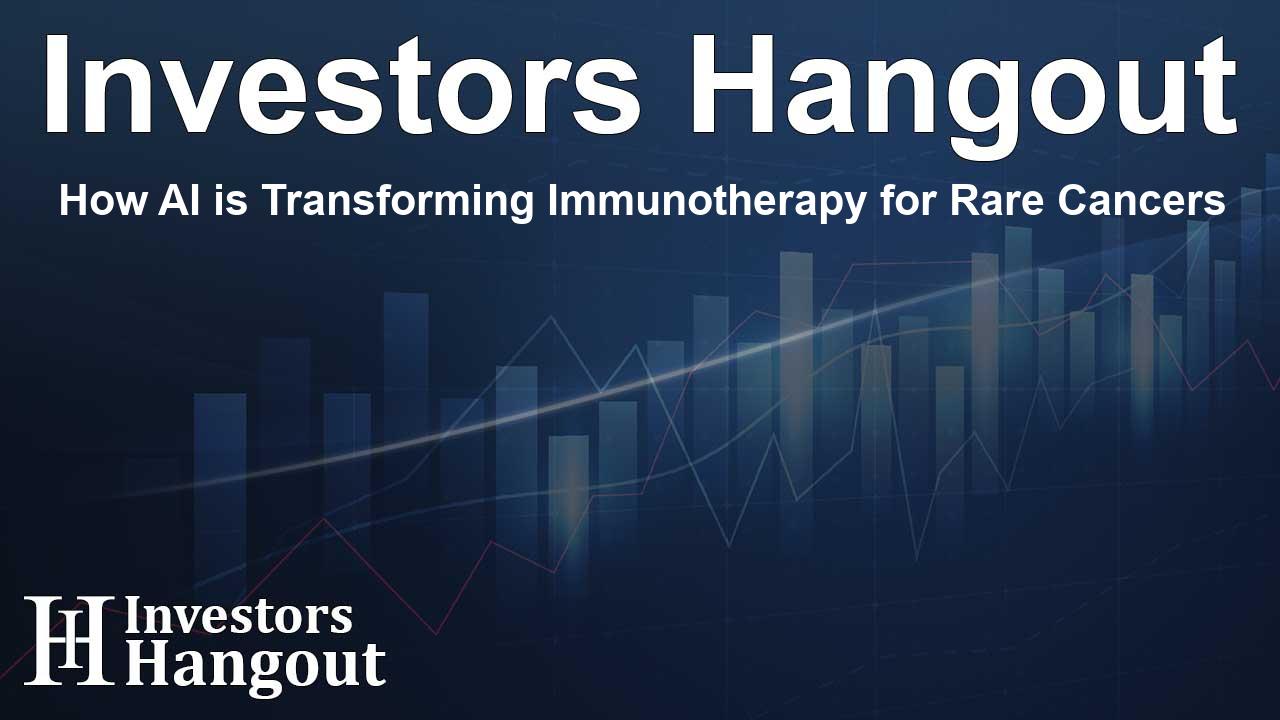How AI is Transforming Immunotherapy for Rare Cancers

Exploring AI's Role in Immunotherapy for Rare Tumors
Study reveals potential of AI-powered tumor microenvironment assessment in predicting treatment outcomes in rare cancer patients receiving pembrolizumab
Lunit (KRX:328130.KQ), an innovative leader in AI-driven solutions for cancer diagnostics and therapies, unveiled pivotal research revealing their AI's capacity to forecast immunotherapy results in patients with rare tumors. This groundbreaking study, developed in collaboration with The University of Texas MD Anderson Cancer Center, is set to be showcased at an important medical meeting focusing on cancer treatment.
Significance of the Study
Dr. Aung Naing, the principal investigator and a leading authority in Investigational Cancer Therapeutics at MD Anderson, spearheaded the research utilizing Lunit's advanced whole-slide image analyzer, Lunit SCOPE IO. This powerful tool allowed for an in-depth examination of tumor microenvironments in biopsies collected from patients prior to and during treatment with pembrolizumab, an immune checkpoint inhibitor.
Key Insights on Treatment Responses
The comprehensive study analyzed over 500 slides derived from more than 10 distinct rare tumor categories. The findings suggested that Lunit SCOPE IO effectively highlighted specific patterns within tumor samples that are indicative of favorable treatment responses. The research specifically demonstrated that patients whose samples displayed enhancements in indicators measured by AI, including intratumoral immune cell presence and tumor characteristics, had significantly improved outcomes from immunotherapy.
Remarkable Findings from the Research
Key discoveries from this significant study included:
- Higher pre-treatment levels of tumor-infiltrating lymphocytes (iTIL) correlated with a 51% decrease in disease progression risk or mortality.
- Increases in iTIL density during treatment biopsies reflected a 35% reduction in disease progression or mortality risk, and a noteworthy 41% reduction in death risk.
- Patients exhibiting reduced tumor content during treatment had a 49% lower risk of disease progression or death and a 46% decreased mortality risk.
- The most striking results showed that patients experiencing both increased iTIL density and decreased tumor content had incredibly favorable outcomes.
- 68% lower disease progression or mortality risk was observed.
- 72% reduction in mortality risk was recorded for these patients.
CEO's Insight on the Findings
Brandon Suh, the CEO of Lunit, remarked, "These findings illuminate how our AI technology can deepen insights into the unique and complex tumor microenvironments associated with rare cancers. It marks significant advancements in our grasp of rare tumor biology. This research demonstrates the value Lunit SCOPE IO brings in crucial clinical scenarios, emphasizing its capability to tailor treatment for patients with limited options. Our developments underscore the transformative role AI can play in oncology and improve patient experiences."
Future Collaborations and Goals
With an aim to broaden and enhance Lunit SCOPE IO's capabilities, the company is dedicated to ongoing collaboration with premier cancer research institutions. Their mission is to continue delivering impactful and innovative solutions for patients facing restricted treatment choices, ultimately reshaping cancer care.
Learn More at Upcoming Events
Those interested in further learning about the study's outcomes and Lunit's offerings can visit the company’s booth at the upcoming meeting focused on innovative cancer treatments.
About Lunit
Established in 2013, Lunit (KRX:328130.KQ) is at the forefront of medical AI, driven by a commitment to combating cancer. They employ AI-based medical imaging analytics and biomarkers to facilitate accurate diagnostics and personalized treatment plans for cancer patients. With FDA approval for their Lunit INSIGHT platform for cancer screening, the tool is utilized by over 4,500 healthcare institutions globally.
Lunit's studies have gained recognition in renowned journals, including the Journal of Clinical Oncology and Lancet Digital Health, and have been presented at major global conferences. In a strategic move, Lunit acquired a leading health technology firm in 2024 to bolster its offerings in areas like breast health and screening. Headquartered in Seoul, South Korea, Lunit is dedicated to leading the global battle against cancer.
Frequently Asked Questions
What is the main purpose of Lunit's recent study?
The study aims to showcase how AI technology can predict treatment outcomes for rare cancer patients undergoing immunotherapy using pembrolizumab.
How does Lunit SCOPE IO contribute to cancer treatment?
Lunit SCOPE IO analyzes tumor microenvironments to identify indicators that correlate with better treatment outcomes for patients.
What are the specific benefits of higher iTIL density as per the research?
Higher iTIL density is associated with significantly improved progression-free survival rates and lower mortality risks.
How is Lunit expanding its capabilities in cancer treatment?
Lunit is partnering with leading cancer research institutions to innovate and provide effective solutions for patients with limited options.
Where can I find more information about Lunit's innovations?
More information about Lunit's research and mission can be found at their booth during key cancer treatment conferences.
About Investors Hangout
Investors Hangout is a leading online stock forum for financial discussion and learning, offering a wide range of free tools and resources. It draws in traders of all levels, who exchange market knowledge, investigate trading tactics, and keep an eye on industry developments in real time. Featuring financial articles, stock message boards, quotes, charts, company profiles, and live news updates. Through cooperative learning and a wealth of informational resources, it helps users from novices creating their first portfolios to experts honing their techniques. Join Investors Hangout today: https://investorshangout.com/
Disclaimer: The content of this article is solely for general informational purposes only; it does not represent legal, financial, or investment advice. Investors Hangout does not offer financial advice; the author is not a licensed financial advisor. Consult a qualified advisor before making any financial or investment decisions based on this article. The author's interpretation of publicly available data shapes the opinions presented here; as a result, they should not be taken as advice to purchase, sell, or hold any securities mentioned or any other investments. The author does not guarantee the accuracy, completeness, or timeliness of any material, providing it "as is." Information and market conditions may change; past performance is not indicative of future outcomes. If any of the material offered here is inaccurate, please contact us for corrections.